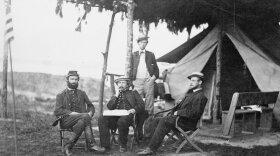-
The Wenatchee Valley Museum and Cultural Center hosts an event celebrating diversity in Wenatchee ahead of Martin Luther King Jr. Day.
-
Decades later, Birmingham News Pulitzer Prize-winning columnist John Archibald is trying to do just that. Archibald comes from a long line of Methodist preachers in the South; his father had a pulpit at a critical time and place in American history — 1960s Alabama.
-
As we enter 2021, we can all draw inspiration from both King and Hughes. Morning Edition resident poet Kwame Alexander and host Rachel Martin suggest we write our way out of the unprecedented events of the past year and into a space of possibility.
-
The "Get Your Knee Off Our Necks" march comes as frustration over police brutality and use of force have sparked national protests following the Memorial Day killing of George Floyd.
-
Lowery got his start as an activist organizing bus boycotts in 1950s Alabama. He led the Southern Christian Leadership Conference for two decades and prayed at Barack Obama's first inauguration.
-
Stevenson built a museum and monument in Alabama dedicated to slavery and its legacy. "We need to create institutions in this country that motivate more people to say 'Never again,' " he says.
-
Without money from the Delta Air Lines Foundation, Atlanta's Martin Luther King, Jr. National Historical Park would have been closed for the King holiday, a National Park Service spokesman told NPR.
-
Bayard Rustin's legacy as a leading figure in the civil rights movement is little known today, even among many history buffs and within the LGBTQ community. His homosexuality cost him that visibility and was considered by some as a hindrance to the movement's success.
-
There's an episode of The Johnny Cash Show from 1969 where the man himself makes a little speech with a pretty big error. "Here's a song that was reportedly sung by both sides in the Civil War," Cash says, guitar in hand, to kick off a performance of "The Battle Hymn of the Republic." The real history is clear: Julia Ward Howe wrote the song as a pro-Union, anti-slavery anthem. But then Cash goes on to say, " .... which proves to me that a song can belong to all of us." And about that, he's right.
-
Fifty years after the murder of Martin Luther King Jr., alternate theories about his death continue to flourish. Three men who investigated the crime said they're confident in their conclusions.
Play Live Radio
Next Up:
0:00
0:00
Available On Air Stations










